外研版(2019) 必修 第三册 Unit 2 Making a difference Grammar & Vocabulary(共45张PPT)
文档属性
| 名称 | 外研版(2019) 必修 第三册 Unit 2 Making a difference Grammar & Vocabulary(共45张PPT) |  | |
| 格式 | zip | ||
| 文件大小 | 4.0MB | ||
| 资源类型 | 教案 | ||
| 版本资源 | 外研版(2019) | ||
| 科目 | 英语 | ||
| 更新时间 | 2023-03-12 11:33:51 | ||
图片预览

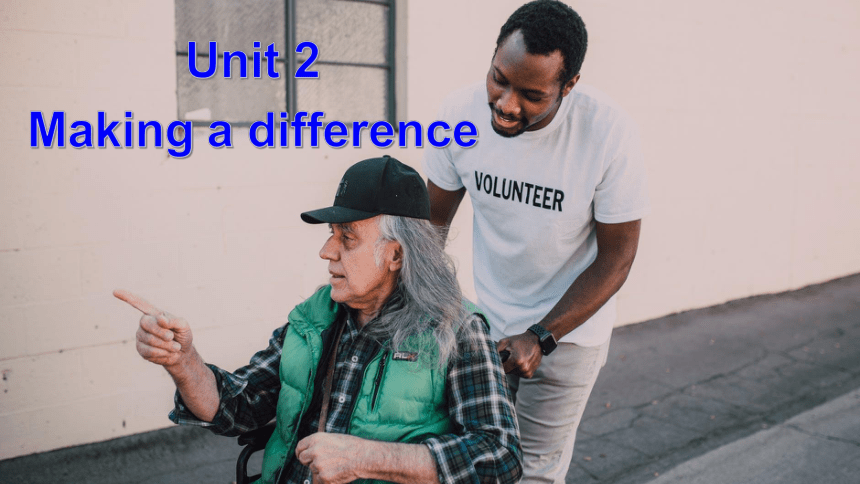
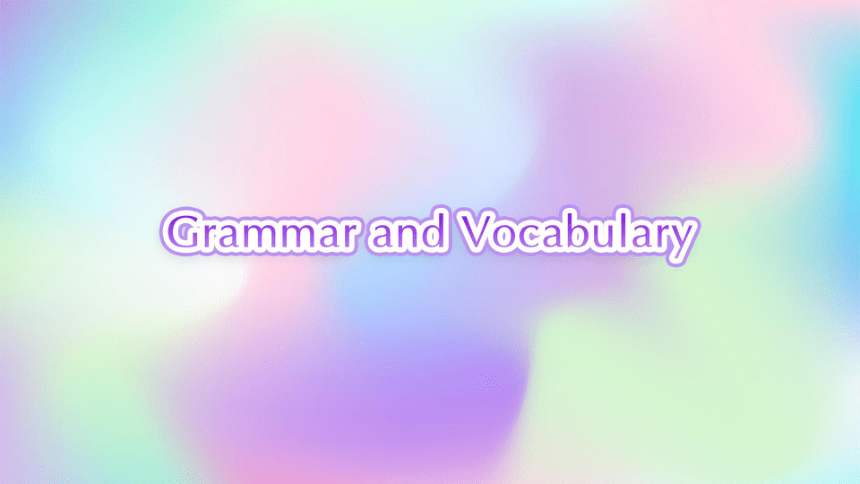
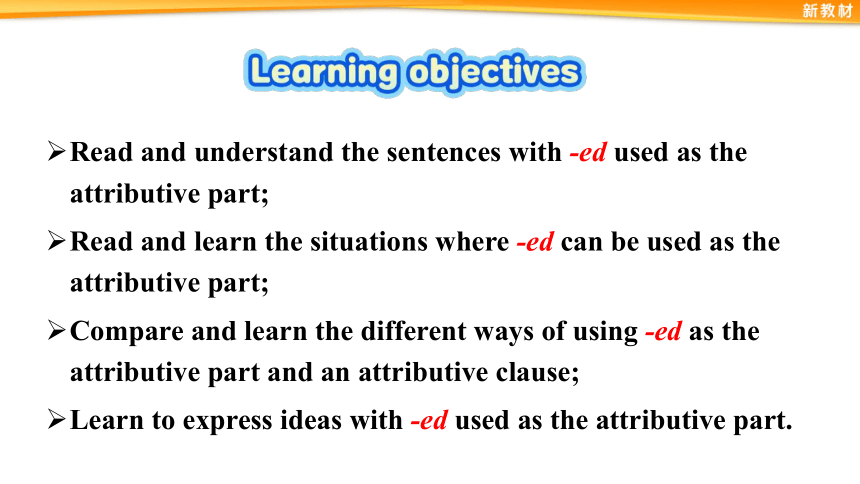
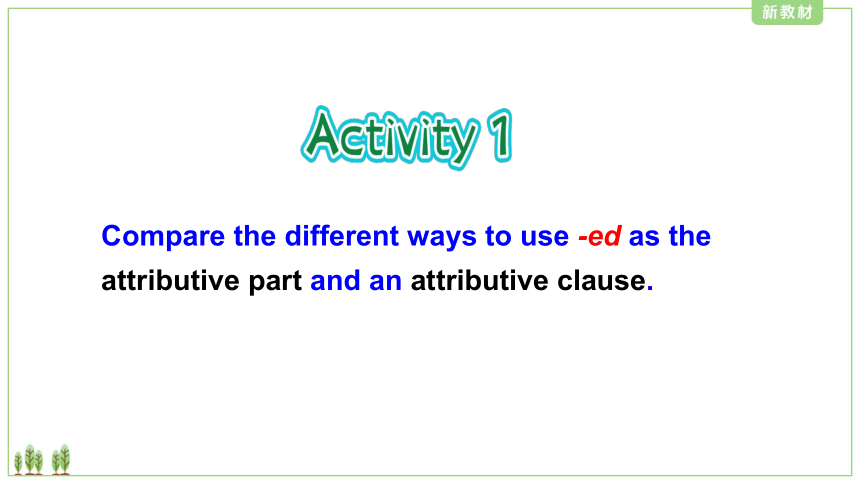
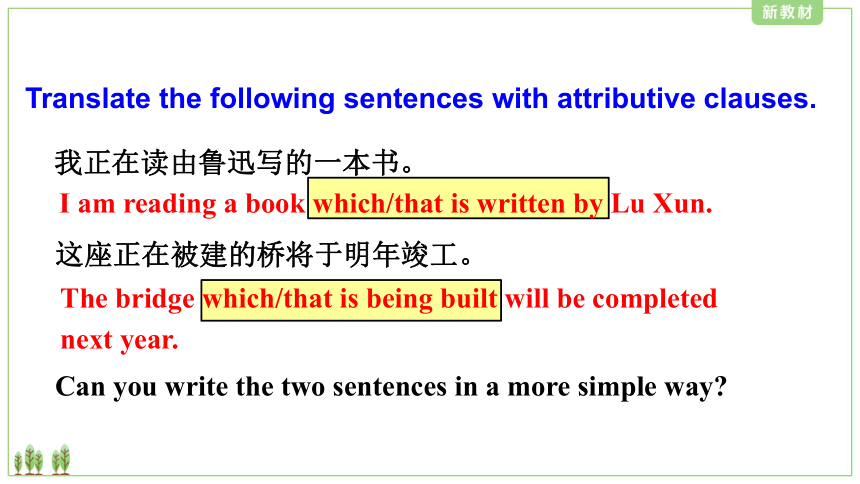
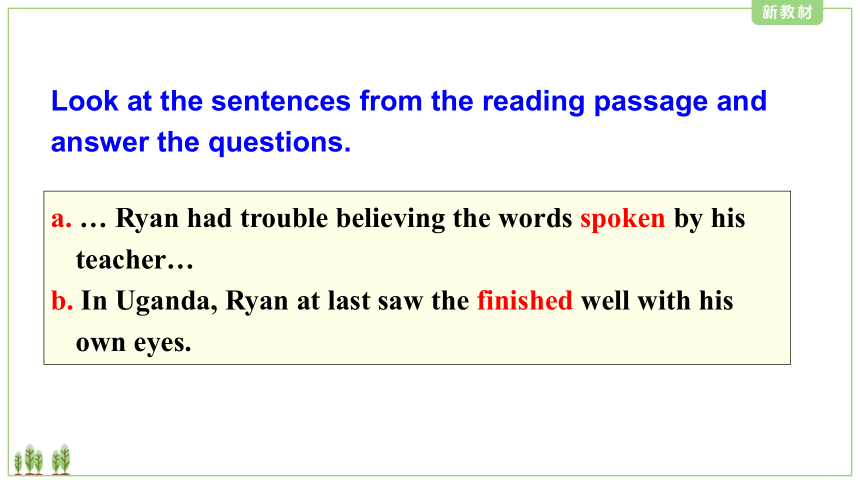
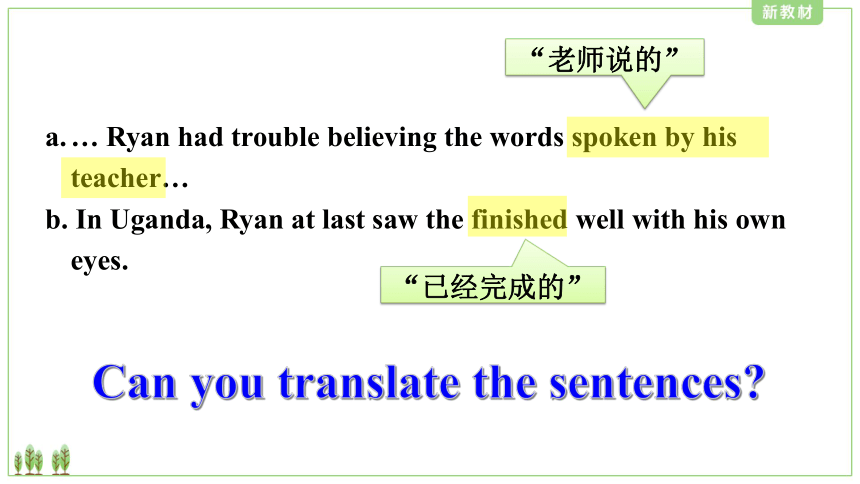
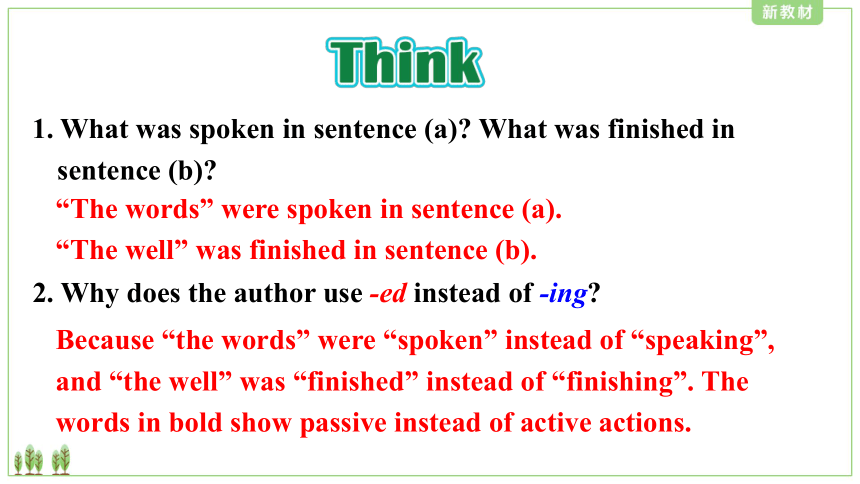
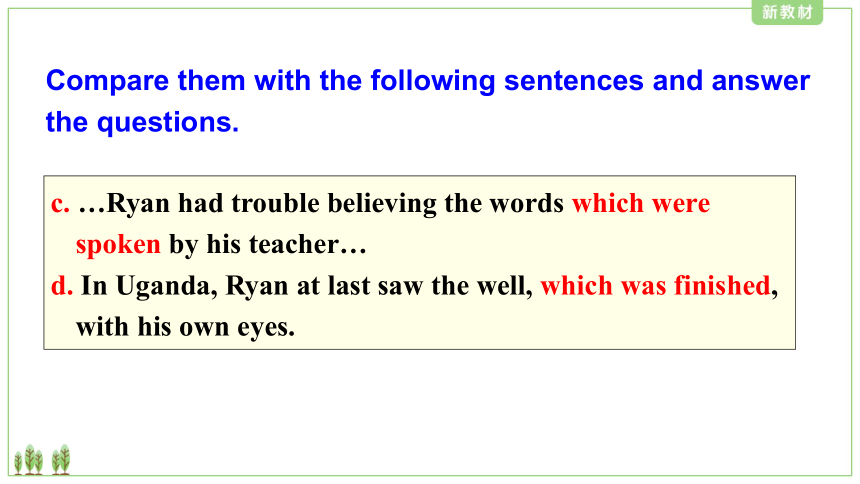
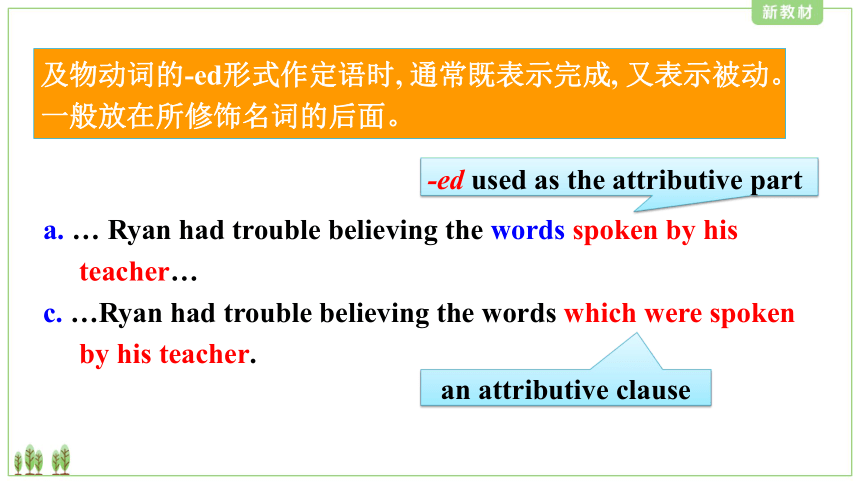
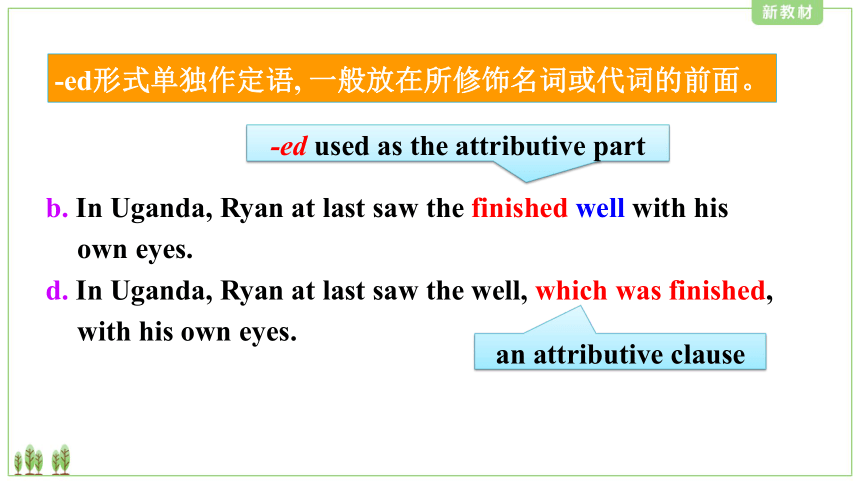
文档简介
(共45张PPT)
Unit 2
Unit 2
Making a difference
Read and understand the sentences with -ed used as the attributive part;
Read and learn the situations where -ed can be used as the attributive part;
Compare and learn the different ways of using -ed as the attributive part and an attributive clause;
Learn to express ideas with -ed used as the attributive part.
Compare the different ways to use -ed as the attributive part and an attributive clause.
The bridge which/that is being built will be completed next year.
Translate the following sentences with attributive clauses.
我正在读由鲁迅写的一本书。
I am reading a book which/that is written by Lu Xun.
这座正在被建的桥将于明年竣工。
Can you write the two sentences in a more simple way
Look at the sentences from the reading passage and answer the questions.
a. … Ryan had trouble believing the words spoken by his teacher…
b. In Uganda, Ryan at last saw the finished well with his own eyes.
… Ryan had trouble believing the words spoken by his teacher…
b. In Uganda, Ryan at last saw the finished well with his own eyes.
“老师说的”
“已经完成的”
Can you translate the sentences
1. What was spoken in sentence (a) What was finished in sentence (b)
2. Why does the author use -ed instead of -ing
“The words” were spoken in sentence (a).
“The well” was finished in sentence (b).
Because “the words” were “spoken” instead of “speaking”, and “the well” was “finished” instead of “finishing”. The words in bold show passive instead of active actions.
c. …Ryan had trouble believing the words which were spoken by his teacher…
d. In Uganda, Ryan at last saw the well, which was finished, with his own eyes.
Compare them with the following sentences and answer the questions.
-ed used as the attributive part
a. … Ryan had trouble believing the words spoken by his teacher…
c. …Ryan had trouble believing the words which were spoken by his teacher.
an attributive clause
及物动词的-ed形式作定语时, 通常既表示完成, 又表示被动。一般放在所修饰名词的后面。
b. In Uganda, Ryan at last saw the finished well with his own eyes.
d. In Uganda, Ryan at last saw the well, which was finished, with his own eyes.
-ed used as the attributive part
an attributive clause
-ed形式单独作定语, 一般放在所修饰名词或代词的前面。
3. What is the difference between the two groups of sentences
4. Why does the author choose to use -ed instead of an attributive clause in the reading passage
Sentences (a) and (b) contain –ed as attributive while sentences (c) and (d) contain attributive clauses.
The sentences using –ed as attributive are more concise and formal.
Now look for more sentences with -ed as attributive in the reading passage.
1) What they needed was a well dug near their homes.
挖在他们家附近的井
2) Many inspired people gave him their support.
受到鼓舞的
another two -ed forms
3) He also saw hundreds of delighted students who had turned out to welcome him.
4) This insight grew from the determined attitude of a six-year-old boy who had…
-ed also can be used as an attribute with the meaning “……的”。
过去分词作定语
过去分词作定语,一般表示其与所修饰的名词之间是被动关系,且表示的动作已完成。
e.g. You’d better use the boiled water to make tea.
The nurse was sent to attend the injured man.
2. 单个过去分词作定语一般放名词前,过去分词短语作定语一般放名词后。
e.g. We must adapt to the changed conditions.
Have you read the novel written by Charles Dickens
In the end, the suggestion given by Mr. Smith was adopted.
3. 不及物动词的过去分词作定语,只表示完成的含义,不表示被动的含义。
e.g. The police are searching for the escaped prisoner.
The old man over there is a retired worker.
4. 动词不定式短语作定语时,在意义上相当于一个定语从句。
eg There are three villages destroyed by the storm.
= There are three villages which / that were destroyed
by the storm.
I found the cup broken by the cat under the table.
= I found the cup which / that was broken by the cat
under the table.
1. Most colleges now offer first-year students a course specially _________ (design) to help them succeed academically and personally.
2. There have been many advances in medicine in recent
years. That means money _______ (use) for medical
research has been well spent.
designed
used
用括号内所给单词的正确形式填空。
3. The Town Hall ___________(complete) in the 1880’s was the most distinguished building at the time.
4. “Things __________(lose) never come again!” I couldn’t help talking to myself.
5. Five people won the “China’s Green Figure” award, a title __________(give) to ordinary people for their contributions to environmental protection.
completed
lost
given
Read the discussion between two students about Ryan’s foundation. Rewrite the underlined sentences using the
-ed form.
Ryan is a young man who is admired by a lot of people.
Ryan is a young man admired by a lot of people.
find out the attributive clause
replace the attributive clause with -ed form.
The money which is raised by his foundation supports schools and communities in Africa.
The money raised by his foundation supports schools and communities in Africa.
As in the words which were spoken by Ryan, we need to not only donate money but also get new ideas.
As in the words spoken by Ryan, we need to not only donate money but also get new ideas.
I think the support which is needed includes new technology for recycling water and education on how to use and save water.
I think the support needed includes new technology for recycling water and education on how to use and save water.
Read the passage and choose the correct form of the words.
The United Nations Children’s Fund, also knowing / known as UNICEF, is a United Nations (UN) organisation basing / based in New York. It offers help needing / needed by children all over the world.
v.-ing 表示正在进行中的
v.-ing修饰those, those与live之间为主动关系
UNICEF was founded on 11 December 1946, to provide food and healthcare to children in countries damaging / damaged in World War II. Since 1953, the UNICEF has taken up an extended mission to help children in the developing / developed world, including those living / lived with diseases or disabilities, and those affecting / affected by rapid modernisation and environmental problems. Now, UNICEF has been working to improve the lives of children and their families across 190 countries and territories.
v.-ing shows an active relationship while
v.-ed shows a passive relationship;
v.-ed can be used as an adjective which means “……的”while v.-ing is used as an adjective which means “令人……的”;
when used as an attributive part, v.-ed and v.-ing can be used to replace an attributive clause.
Read and learn to describe personal qualities.
words used to describe your friend
tall short
beautiful handsome
cute lovely
generous mean
easygoing shy
clever smart
careful careless
warm-hearted kind
helpful kind
naughty serious
What is your friend like
Personal qualities
Read the descriptions and underline the words that describe personal qualities.
He’s sensitive and rather serious, which sometimes makes him appear to be a little bookish. But he’s also an independent thinker. He always knows how to make wise decisions.
Liu Tao
She’s usually very shy, but she’s generous and never hesitates to help. She’s also the most honest person I know. I can always trust her with my secrets.
Li Mei
He’s always confident about everything. He’s a good public speaker and I have never seen him get nervous. And he’s creative. He often comes up with good ideas.
Tim
She’s easygoing with a sense of humour. She’ll try to cheer you up if you have a problem, but she’s kind of lazy. Her desk is extremely messy!
Anna
Put the words you underlined in Activity 4 into the table. Add any more you can think of.
Positive Neutral Negative
independent generous
honest confident
creative easygoing
loyal intelligent
warm-hearted
straightforward
sensitive
serious bookish
shy
self-conscious
strict
nervous
lazy
short-sighted
selfish
mean
slack
Work in pairs. Talk about people’s personal qualities using the words you have learnt.
A: I think my cousin is brave.
B: Why do you think so
A: Because he always knows how to make wise decisions.
…
hesitate v. to pause before saying or doing sth.
because you are nervous or not sure 犹豫,踌躇
hesitate about/over… 对……犹豫
hestitate to do… 犹豫着要做某事
eg He hesitated for a moment and then said “yes”.
He was hesitating over whether to leave or not.
1. …she’s generous and never hesitates to help.
hesitation n. 踌躇,犹豫
without hesitation 毫不犹豫地
have no hesitation in doing sth. 毫不犹豫地做某事
【语境应用】完成句子。
1) 他对是否加入这个俱乐部仍拿不定主意。
He’s still ____________________________________ the club.
2) Lucy毫不犹豫地作了回答。
Lucy replied _____________________________.
3) 你有问题就直截了当地告诉我们。
______________________________ if you have a problem.
4) 你应该毫不犹豫地接受这样的提议。
You should ______________________accepting such an offer.
have no hesitation in
hesitating about / over whether to join
without hesitating / hesitation
Don’t hesitate to tell us
2. He often comes up with good ideas.
come up with: to think of an idea, answer 想出,想到(主意、答案等)
eg We’re asked to come up with some new ideas.
come
短语
come up 走进;出现;被提出
come on 来吧;赶快
come about 发生;产生
come across 遇见,(偶然)发现
when it comes to … 涉及;谈到
come to 来到(某地);加起来总共
【语境应用】单句语法填空。
1) —Alvin, are you coming with us
—I’d love to, but something unexpected has come
________.
2) I’ll never understand how it came ________ that you
were late three times a week.
3) When walking down the street, I came ________
David, whom I hadn’t seen for years.
up
about
across
You have seen many movies and animations (动画片) with the most 1. ________ (advance) technology. And you can probably recognise many of today’s popular actresses and actors. But have you ever heard of Charlie Chaplin Charlie Chaplin was one of the greatest actors in the world.
用括号内单词的正确形式填空。
advanced
During the time of silent movies, Chaplin was the highest 2. ________ (pay) person in the world — not just the actor 3. ________ (earn) the most money. His amusing ( 滑稽的) character, the Little Tramp, with his 4. ________ (wear-out) shoes, round hat, and cane (手杖), is still well 5. ________ (know) to people throughout the world.
paid
earning
worn-out
known
1. Review -ed as attributive and do some relevant exercises.
2. Find more words that describe personal qualities, and write five sentences about your friends.
Unit 2
Unit 2
Making a difference
Read and understand the sentences with -ed used as the attributive part;
Read and learn the situations where -ed can be used as the attributive part;
Compare and learn the different ways of using -ed as the attributive part and an attributive clause;
Learn to express ideas with -ed used as the attributive part.
Compare the different ways to use -ed as the attributive part and an attributive clause.
The bridge which/that is being built will be completed next year.
Translate the following sentences with attributive clauses.
我正在读由鲁迅写的一本书。
I am reading a book which/that is written by Lu Xun.
这座正在被建的桥将于明年竣工。
Can you write the two sentences in a more simple way
Look at the sentences from the reading passage and answer the questions.
a. … Ryan had trouble believing the words spoken by his teacher…
b. In Uganda, Ryan at last saw the finished well with his own eyes.
… Ryan had trouble believing the words spoken by his teacher…
b. In Uganda, Ryan at last saw the finished well with his own eyes.
“老师说的”
“已经完成的”
Can you translate the sentences
1. What was spoken in sentence (a) What was finished in sentence (b)
2. Why does the author use -ed instead of -ing
“The words” were spoken in sentence (a).
“The well” was finished in sentence (b).
Because “the words” were “spoken” instead of “speaking”, and “the well” was “finished” instead of “finishing”. The words in bold show passive instead of active actions.
c. …Ryan had trouble believing the words which were spoken by his teacher…
d. In Uganda, Ryan at last saw the well, which was finished, with his own eyes.
Compare them with the following sentences and answer the questions.
-ed used as the attributive part
a. … Ryan had trouble believing the words spoken by his teacher…
c. …Ryan had trouble believing the words which were spoken by his teacher.
an attributive clause
及物动词的-ed形式作定语时, 通常既表示完成, 又表示被动。一般放在所修饰名词的后面。
b. In Uganda, Ryan at last saw the finished well with his own eyes.
d. In Uganda, Ryan at last saw the well, which was finished, with his own eyes.
-ed used as the attributive part
an attributive clause
-ed形式单独作定语, 一般放在所修饰名词或代词的前面。
3. What is the difference between the two groups of sentences
4. Why does the author choose to use -ed instead of an attributive clause in the reading passage
Sentences (a) and (b) contain –ed as attributive while sentences (c) and (d) contain attributive clauses.
The sentences using –ed as attributive are more concise and formal.
Now look for more sentences with -ed as attributive in the reading passage.
1) What they needed was a well dug near their homes.
挖在他们家附近的井
2) Many inspired people gave him their support.
受到鼓舞的
another two -ed forms
3) He also saw hundreds of delighted students who had turned out to welcome him.
4) This insight grew from the determined attitude of a six-year-old boy who had…
-ed also can be used as an attribute with the meaning “……的”。
过去分词作定语
过去分词作定语,一般表示其与所修饰的名词之间是被动关系,且表示的动作已完成。
e.g. You’d better use the boiled water to make tea.
The nurse was sent to attend the injured man.
2. 单个过去分词作定语一般放名词前,过去分词短语作定语一般放名词后。
e.g. We must adapt to the changed conditions.
Have you read the novel written by Charles Dickens
In the end, the suggestion given by Mr. Smith was adopted.
3. 不及物动词的过去分词作定语,只表示完成的含义,不表示被动的含义。
e.g. The police are searching for the escaped prisoner.
The old man over there is a retired worker.
4. 动词不定式短语作定语时,在意义上相当于一个定语从句。
eg There are three villages destroyed by the storm.
= There are three villages which / that were destroyed
by the storm.
I found the cup broken by the cat under the table.
= I found the cup which / that was broken by the cat
under the table.
1. Most colleges now offer first-year students a course specially _________ (design) to help them succeed academically and personally.
2. There have been many advances in medicine in recent
years. That means money _______ (use) for medical
research has been well spent.
designed
used
用括号内所给单词的正确形式填空。
3. The Town Hall ___________(complete) in the 1880’s was the most distinguished building at the time.
4. “Things __________(lose) never come again!” I couldn’t help talking to myself.
5. Five people won the “China’s Green Figure” award, a title __________(give) to ordinary people for their contributions to environmental protection.
completed
lost
given
Read the discussion between two students about Ryan’s foundation. Rewrite the underlined sentences using the
-ed form.
Ryan is a young man who is admired by a lot of people.
Ryan is a young man admired by a lot of people.
find out the attributive clause
replace the attributive clause with -ed form.
The money which is raised by his foundation supports schools and communities in Africa.
The money raised by his foundation supports schools and communities in Africa.
As in the words which were spoken by Ryan, we need to not only donate money but also get new ideas.
As in the words spoken by Ryan, we need to not only donate money but also get new ideas.
I think the support which is needed includes new technology for recycling water and education on how to use and save water.
I think the support needed includes new technology for recycling water and education on how to use and save water.
Read the passage and choose the correct form of the words.
The United Nations Children’s Fund, also knowing / known as UNICEF, is a United Nations (UN) organisation basing / based in New York. It offers help needing / needed by children all over the world.
v.-ing 表示正在进行中的
v.-ing修饰those, those与live之间为主动关系
UNICEF was founded on 11 December 1946, to provide food and healthcare to children in countries damaging / damaged in World War II. Since 1953, the UNICEF has taken up an extended mission to help children in the developing / developed world, including those living / lived with diseases or disabilities, and those affecting / affected by rapid modernisation and environmental problems. Now, UNICEF has been working to improve the lives of children and their families across 190 countries and territories.
v.-ing shows an active relationship while
v.-ed shows a passive relationship;
v.-ed can be used as an adjective which means “……的”while v.-ing is used as an adjective which means “令人……的”;
when used as an attributive part, v.-ed and v.-ing can be used to replace an attributive clause.
Read and learn to describe personal qualities.
words used to describe your friend
tall short
beautiful handsome
cute lovely
generous mean
easygoing shy
clever smart
careful careless
warm-hearted kind
helpful kind
naughty serious
What is your friend like
Personal qualities
Read the descriptions and underline the words that describe personal qualities.
He’s sensitive and rather serious, which sometimes makes him appear to be a little bookish. But he’s also an independent thinker. He always knows how to make wise decisions.
Liu Tao
She’s usually very shy, but she’s generous and never hesitates to help. She’s also the most honest person I know. I can always trust her with my secrets.
Li Mei
He’s always confident about everything. He’s a good public speaker and I have never seen him get nervous. And he’s creative. He often comes up with good ideas.
Tim
She’s easygoing with a sense of humour. She’ll try to cheer you up if you have a problem, but she’s kind of lazy. Her desk is extremely messy!
Anna
Put the words you underlined in Activity 4 into the table. Add any more you can think of.
Positive Neutral Negative
independent generous
honest confident
creative easygoing
loyal intelligent
warm-hearted
straightforward
sensitive
serious bookish
shy
self-conscious
strict
nervous
lazy
short-sighted
selfish
mean
slack
Work in pairs. Talk about people’s personal qualities using the words you have learnt.
A: I think my cousin is brave.
B: Why do you think so
A: Because he always knows how to make wise decisions.
…
hesitate v. to pause before saying or doing sth.
because you are nervous or not sure 犹豫,踌躇
hesitate about/over… 对……犹豫
hestitate to do… 犹豫着要做某事
eg He hesitated for a moment and then said “yes”.
He was hesitating over whether to leave or not.
1. …she’s generous and never hesitates to help.
hesitation n. 踌躇,犹豫
without hesitation 毫不犹豫地
have no hesitation in doing sth. 毫不犹豫地做某事
【语境应用】完成句子。
1) 他对是否加入这个俱乐部仍拿不定主意。
He’s still ____________________________________ the club.
2) Lucy毫不犹豫地作了回答。
Lucy replied _____________________________.
3) 你有问题就直截了当地告诉我们。
______________________________ if you have a problem.
4) 你应该毫不犹豫地接受这样的提议。
You should ______________________accepting such an offer.
have no hesitation in
hesitating about / over whether to join
without hesitating / hesitation
Don’t hesitate to tell us
2. He often comes up with good ideas.
come up with: to think of an idea, answer 想出,想到(主意、答案等)
eg We’re asked to come up with some new ideas.
come
短语
come up 走进;出现;被提出
come on 来吧;赶快
come about 发生;产生
come across 遇见,(偶然)发现
when it comes to … 涉及;谈到
come to 来到(某地);加起来总共
【语境应用】单句语法填空。
1) —Alvin, are you coming with us
—I’d love to, but something unexpected has come
________.
2) I’ll never understand how it came ________ that you
were late three times a week.
3) When walking down the street, I came ________
David, whom I hadn’t seen for years.
up
about
across
You have seen many movies and animations (动画片) with the most 1. ________ (advance) technology. And you can probably recognise many of today’s popular actresses and actors. But have you ever heard of Charlie Chaplin Charlie Chaplin was one of the greatest actors in the world.
用括号内单词的正确形式填空。
advanced
During the time of silent movies, Chaplin was the highest 2. ________ (pay) person in the world — not just the actor 3. ________ (earn) the most money. His amusing ( 滑稽的) character, the Little Tramp, with his 4. ________ (wear-out) shoes, round hat, and cane (手杖), is still well 5. ________ (know) to people throughout the world.
paid
earning
worn-out
known
1. Review -ed as attributive and do some relevant exercises.
2. Find more words that describe personal qualities, and write five sentences about your friends.
